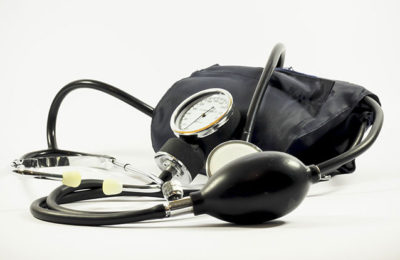
Hypertension is a condition where the blood pressure (BP) in the arteries is elevated beyond the normal limits. Hypertension (also referred to as “high blood pressure”) usually does not cause symptoms but it does put you at risk for heart attack, stroke, and kidney disease and can be serious when the pressure is very elevated.
BP is measured in mmHg and consists of 2 numbers. The top number (systolic) is the pressure inside your arteries when your heart is contracting. The bottom number (diastolic) is the pressure inside your arteries when your heart is relaxed.
“Prehypertension” is a term used as a warning. People with prehypertension do not yet have high blood pressure but at risk for developing high BP.
Blood pressure levels
| Level | Top Number | Bottom Number |
|---|---|---|
| High | 140 or above | 90 or above |
| Prehypertension | 120 to 139 | 80 to 89 |
| Normal | 119 or below | 79 or below |
How can I lower my blood pressure?
If you are overweight, have a sedentary lifestyle and poor diet with mild HTN, it may be possible to control BP by significant lifestyle changes such as weight loss, regular aerobic exercise and reducing salt intake. In most cases, you still need a medication and must be taken as prescribed on a regular basis. If the BP is well controlled with medications, then you must continue to take the medications since stopping them will lead to elevation again, and in some cases more than where it started. If the medicine causes side effects, do not just stop taking it. Instead, talk to your doctor or nurse about the problems it causes. He or she might be able to lower your dose or switch you to another medicine. If cost is a problem, mention that, too. He or she might be able to put you on a less-expensive medicine. Taking your blood pressure medicine can keep you from having a heart attack or stroke, and it can save your life!
You have a lot of control over your blood pressure. To lower it:
- Lose weight
- Choose a diet low in fat and salt and rich in fruits and vegetables
- Reduce the amount of salk you eat (ideally reduce sodium intake to less that 2000 mg per day)
- Do something active for at least 30 minutes a day on most days of the week. Even walking, swimming or light jogging can lower your blood pressure. Yoga, meditation and relaxation techniques can also help control blood pressure
- Cut down on alcohol (if you drink more than two alcoholic drinks per day)
It’s also a good idea to get a home blood pressure meter and maintain a regular log of blood pressure readings. Most doctors recommend taking a blood pressure reading early in morning but you can also take in late afternoon or early evening, when for most people the daytime activities and stress are high. Bring the log and the blood pressure machine to your doctor appointments so they can even help check the monitor for accuracy compared to their well-calibrated machines.